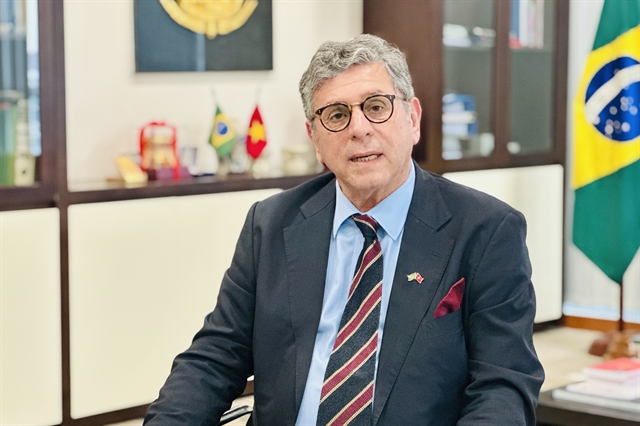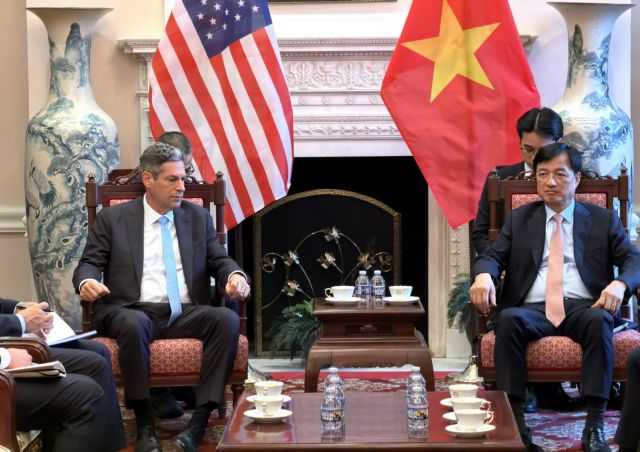 Opinion
Opinion

 |
| Brazilian Ambassador to Việt Nam Marco Farani. — VNA/VNS Photo |
HÀ NỘI — Prime Minister Phạm Minh Chính is expected to make valuable contributions to the upcoming expanded BRICS summit in Brazil, according to Brazilian Ambassador to Việt Nam Marco Farani.
Talking to the press ahead of PM Chính’s trip for his attendance at the summit and bilateral activities in Brazil from July 4-8, Farani stated that the Brazilian government, as the rotating Chair of BRICS, is pleased to welcome Việt Nam’s official participation in the group as a 'partner country'.
This move will help enhance the group's capacity, further affirm its role and position on the international stage as well as in the global trade value chain, and at the same time, strengthen the importance of multilateralism, as Việt Nam is a stable country with a dynamic and efficient economy, clear growth objectives, and harmonious integration into the global value chain.
Việt Nam’s becoming a BRICS 'partner country' is warmly welcomed, and Brazil expects it to play an active and proactive role in advancing goals related to trade, investment, energy transition, sustainable environmental and social development, enhancing connectivity, and promoting equitable access to innovation.
According to the diplomat, in an increasingly unstable international context marked by escalating conflicts, economic fluctuations, and a rising trend of protectionism that hinders trade flows and the prosperous development of nations, the role of BRICS has become ever more essential.
He pointed out some key figures that demonstrate BRICS’ current potential: BRICS accounts for 40 per cent of the global economy, 23 per cent of the world’s GDP, 18 per cent of international trade, 42 per cent of the global population, 30 per cent of the continental land area, 36 per cent of the global GDP based on purchasing power parity (PPP), and 72 per cent of the world’s rare earth reserves.
At the upcoming summit, Farani expressed his belief that PM Chính will contribute constructive viewpoints on vital issues for developing countries, such as energy transition, financial-economic cooperation, and ensuring equitable access to innovation.
The summit, held from July 6-7 in Rio de Janeiro under the theme of "Strengthening Global South Cooperation for More Inclusive and Sustainable Governance", will focus on discussing six main topics of reforming the architecture of multilateral peace and security; cooperating in the health sector; improving the international financial system; addressing the climate crisis; artificial intelligence; and strengthening BRICS institutions and expanding participation, and dialogue with various social groups.
Regarding Việt Nam-Brazil ties, the ambassador affirmed that the bilateral relations have made remarkable progress, thanks to high-level visits and the desire of both sides to expand cooperation opportunities.
A clear demonstration is the bilateral trade turnover reaching a record of US$8 billion. Dialogue in the fields of science, technology, and innovation, and cooperation in high-tech agriculture has been strengthened, and an action plan in the defence sector has been signed. In addition, energy transition has emerged as an important area of collaboration.
In 2025, the two countries are continuing to implement the objectives of the action plan signed during the State visit to Việt Nam by President Lula da Silva in March.
According to the diplomat, Brazil and Việt Nam share many similarities and complementary strengths, which are favourable factors for building a sustainable partnership and expanding bilateral trade.
He showed his confidence that the two countries have great prospects for cooperation in the field of energy transition, an area in which Brazil has extensive practical experience and serves as a global model for renewable energy and ethanol programmes.
Additionally, the two countries have great potential for collaboration in high-tech and green agriculture, cybersecurity, semiconductors, digitalisation, biofuels, and new farming technologies, including forest restoration, Farani stated, believing that the positive outcomes from the current dialogue between the two governments will continue to generate solid results in both bilateral and multilateral cooperation in the years ahead. — VNA/VNS




